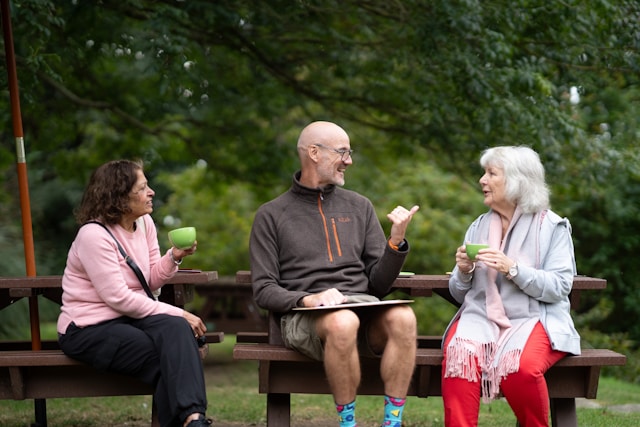
What is Person Centred Care in a Nursing Home?
Rather than offering a one-size-fits-all solution, the person-centred care approach places each resident’s individual needs, preferences, and values at the centre of all decisions and care planning. In a nursing home, person-centred care means looking beyond medical conditions to see the whole person, acknowledging their life story, cultural background, and personal wishes. This method is strongly supported by the NHS and the Royal College of Nursing as research consistently shows that person-centred care leads to improved health outcomes, greater satisfaction, and a more supportive and compassionate environment for residents.
Central to person-centred care is the idea of partnership. Staff work closely with residents and their families, making sure that everyone’s voice is heard and respected. Effective communication is essential, enabling residents to understand their options and participate fully in choices about their care. Person-centred care in clinical practice is important as it shapes all of the daily interactions between residents and carers and helps overcome barriers to delivering genuinely individualised care. This collaborative approach builds trust, supports dignity, and ensures that care is tailored to what matters most to each individual. By embracing person-centred care, nursing homes can provide not just medical support, but a real sense of belonging and wellbeing for every resident.
Key Principles of Person-Centred Care
The key principles of person-centred care provide the foundation for daily practice in nursing homes. Respect for autonomy and dignity is paramount; every resident is encouraged to make choices about their care and daily life, which helps to foster a sense of independence and self-worth. Compassion and empathy are at the heart of all interactions, as staff build genuine relationships with residents, listening carefully and responding to both their emotional and physical needs.
Care planning is a collaborative process, developed in partnership with residents and their families, to ensure that medical, social, and personal preferences are all considered. Involving residents in clinical and healthcare decisions is essential to ensure their voices are heard and respected. Treatment plans and treatment options are key components of care planning, allowing residents to understand and choose the best path for their individual needs. Coordination across healthcare professionals, families, and community services ensures that support is seamless and responsive.
Finally, empowerment is a central theme—residents are supported to express their patients goals and participate actively in decisions about their care, promoting engagement and a sense of control. These principles, championed by the NHS and guided by sound evidence, underpin every aspect of high-quality care and help create a nurturing care home environment where residents can thrive.
Patient Involvement in Person-Centred Care
A core element of person-centred care is the active involvement of patients in their own health and care decisions. Patient-centred care means more than just providing care—it’s about working alongside patients, listening to their concerns, and respecting their individual preferences and values. Healthcare providers play a vital role in supporting patients to make informed decisions, ensuring they have the information and support needed to understand their options and take charge of their own health.
By treating patients as equal partners, healthcare professionals can help improve health literacy, enabling patients to better understand their conditions and the care available to them. This collaborative approach not only enhances the patient experience but also leads to more effective and meaningful care. When patients are empowered to participate in their care, they are more likely to feel supported, respected, and satisfied with the healthcare services they receive.
How Person-Centred Care Works in a Nursing Home
Person-centred care is brought to life in nursing homes through a range of practical, everyday actions. For example, each resident’s care plan is developed with their direct input, as well as insights from their family, ensuring it reflects their life history, hobbies, and preferences. Care providers take time to get to know each resident as an individual, learning about their favourite activities, care routines, and what brings them joy, so that these routines can be personalised to each resident’s needs. This information is used to shape daily life in the home, from meal choices to the types of activities on offer. Flexibility is key—residents are supported to wake up, eat, and participate in activities at times that suit them, rather than adhering to a rigid schedule. Involvement in decision-making is encouraged, whether it’s choosing the day’s menu or helping to decorate communal spaces.
When interacting with residents, care providers use a variety of communication strategies, such as active listening and adapting their approach to individual preferences, to build relationships and support each person’s unique needs. For those living with dementia, staff use personalised strategies such as memory boxes or familiar music to provide comfort and reduce anxiety. Maintaining social connections is a priority, with staff facilitating visits, phone calls, and group activities to help residents stay connected with loved ones and the wider community.
The Role of Families in Supporting Person-Centred Care
Families are essential partners in delivering person-centred care within nursing homes. Their involvement ensures that care is truly tailored to the resident’s unique history, preferences, aspirations, and religious beliefs. By sharing life stories and personal insights, including important aspects such as religious beliefs and family traditions, staff can better understanding of what is most important to their loved one, from favourite pastimes to cultural or spiritual practices. Participating in care planning meetings allows families to advocate for the resident’s wishes and ensure that their voice is heard, especially if the resident has difficulty communicating. This also highlights the involvement of service users and their families in decision-making and personal care planning.
A holistic approach to care involves not only health services but also the integration of social care, ensuring that all aspects of the resident’s wellbeing are addressed. Regular visits, phone calls, and involvement in home events help residents feel loved and supported, while also encouraging social interaction with other residents. Open communication between families and staff is crucial for identifying what is working well and where improvements can be made, ensuring that care remains responsive and effective. In this way, families play a vital role in reinforcing independence, supporting emotional wellbeing, and helping to create a warm, inclusive atmosphere in the nursing home. Their involvement supports patients health and promotes self management, empowering residents to take an active role in their own care.
Facilitators of Person-Centred Care
Ongoing training and education help healthcare professionals develop the core skills and competencies needed to provide care that is truly centred on the individual. Nursing home leadership plays a crucial role by creating a culture that values patient-centeredness, offering resources and support to staff, and establishing policies that prioritise the needs and preferences of patients.
The integration of technology, such as patient portals and telehealth services, can also enhance person-centred care by improving access to healthcare services and making communication between patients and healthcare providers more efficient and effective.
Benefits of Person-Centred Care
-Improved wellbeing and satisfaction for residents, as they feel valued, respected, and understood.
-Better health outcomes, with personalised care plans supporting more effective management of health conditions and reducing hospital admissions.
-Enhanced quality of life, as residents enjoy activities and routines that reflect their interests and help maintain independence.
-Stronger relationships, with collaborative care fostering trust and positive connections between residents, families, and staff. In nursing care, building a strong therapeutic relationship is essential for effective communication and improved patient involvement.
-Greater staff satisfaction, as care teams experience more meaningful interactions and can see the positive impact of their work, especially when person-centred approaches are integrated into nursing care practices.
Person-centred care not only benefits individuals but also strengthens the overall health system by improving healthcare delivery and supporting better outcomes at all levels. The use of person centred approaches is key to achieving these system-wide improvements.
Future of Person-Centred Care in Nursing
As healthcare continues to evolve, nurses and carers will be at the forefront of the move to embed person-centered care into every aspect of nursing practice. This will require a strong focus on core skills education, including effective communication, cultural competence, and emotional intelligence, to ensure nurses can provide care that respects each nursing home resident’s individuality and supports their well-being.
Collaboration with other healthcare professionals, patients, and families will become increasingly important, as integrated care and shared decision making become standard practice. The use of technology, such as artificial intelligence and digital health tools, will further enhance the ability of nurses and other healthcare providers to deliver high-quality, well-coordinated care that meets the diverse needs of individual patients. By embracing these changes and maintaining a commitment to mutual respect, dignity, and partnership, nurses can help shape a healthcare system that puts person-centered care at its core, improving patient experience, health outcomes, and the overall quality of care for all.
Personalised Care at Manor House Care Home in Stafford
Person-centred care is transformative for nursing homes in Stafford and across the UK. By focusing on each resident’s individuality, involving families, and prioritising what truly matters, care homes can deliver support that is not only safe and effective but also compassionate and fulfilling. This approach requires ongoing commitment and collaboration, but the rewards are clear: happier residents, more satisfied families, and a stronger, more caring community.
If you’re looking for a care home in Stafford that puts person-centred care at the heart of everything we do, Manor House Care Home is here for you. Our dedicated team works closely with residents and their families to create a warm, supportive environment where every individual’s needs, preferences, and wishes are respected.
Contact Manor House Care Home today to find out how we can support you or your loved one with compassionate, personalised care that makes a real difference. Call us to arrange a visit or speak with our friendly staff—we’re always happy to help.
Further Information:
NHS England – Person-Centred Care
An overview of what person-centred care means in the NHS and why it matters.
Social Care Institute for Excellence (SCIE) – Person-Centred Care
Practical guidance and resources for implementing person-centred care in social care settings.
Royal College of Nursing – Person-Centred Care
Delivering person-centred care.
Alzheimer’s Society – Person-Centred Care for People with Dementia
Advice and best practice for providing person-centred care to people living with dementia.
